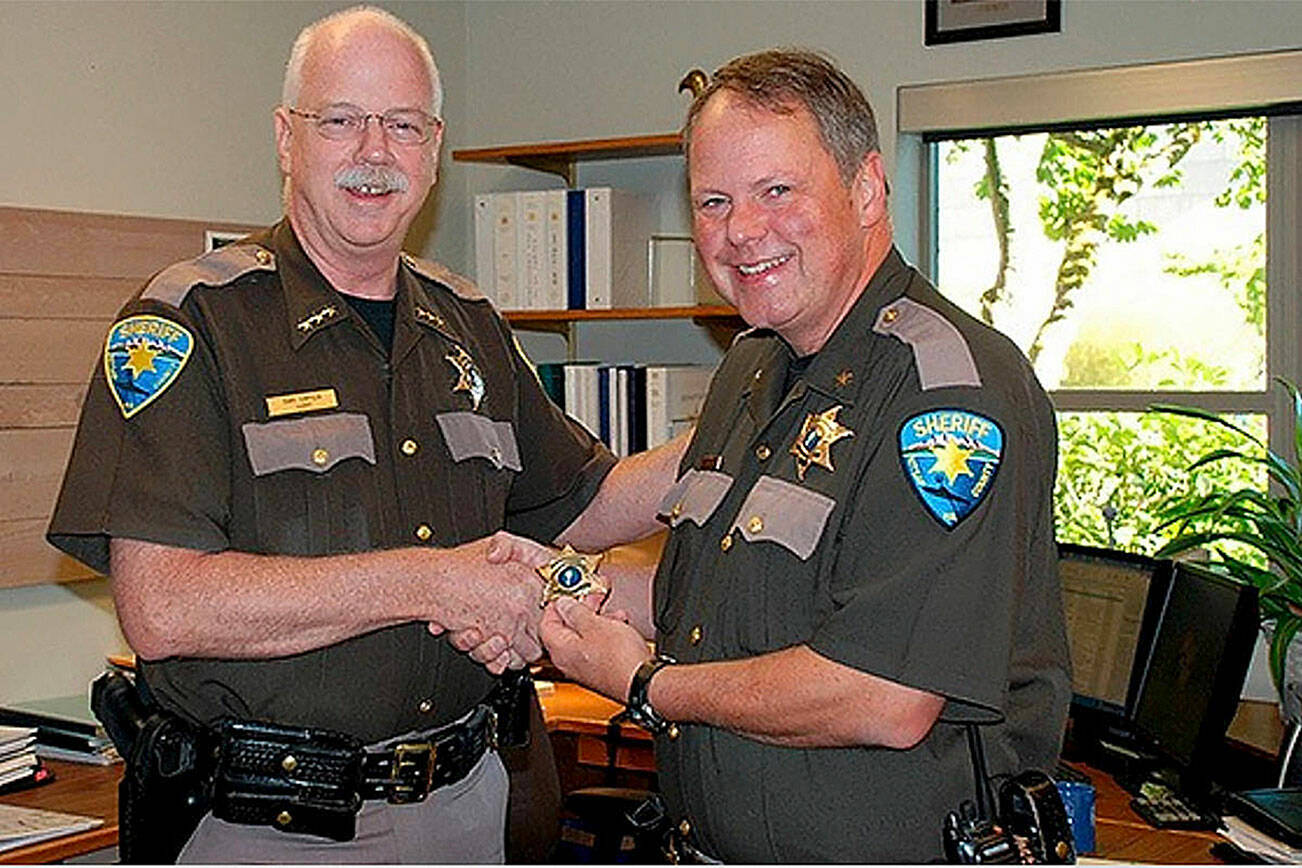A number of ominous issues, including COVID-19, police reform and staffing shortages, have made John Gese’s first full year as Kitsap County sheriff an unprecedented one.
Gese, a 30-year veteran of the Kitsap County Sheriff’s Office who replaced the retiring Gary Simpson as sheriff, outlined the challenges in a presentation recently.
Police reform would top the list in any other year. The COVID-19 pandemic is completing its second year as the overriding concern worldwide.
“COVID has affected our operation tremendously,” the sheriff said. “We stopped our traffic enforcement. In just about every part of our business, we tried to roll back the number of contacts safely and still handle crime when we could.”
“Our support staff worked from home, and our office closed for a while.”
Gese said the jail — a significant part of the sheriff’s operation — was forced to reduce its population from 480 to 150 because of the pandemic. The jail was closed to all but the most serious offenders.
“When you have a population that already has a large proportion of people with serious medical or behavioral issues, that was a critical piece of business we had to protect from COVID,” he said.
”We took a very collaborative approach. We talked with the court and with the prosecutor’s office. That’s not exactly what we wanted to do but it was something we really had to do. Since then, we’ve recovered a bit at the jail, and our population is up to about 300, but we still have to guard against outbreaks.”
Before the pandemic, Gese said the sheriff’s office had five deputies handling traffic. But during the most critical part of the outbreak, he said only one deputy was assigned.
Police reform
The sheriff said the 13 major pieces of legislation out of the state legislature last year involving police reform “has affected just about every avenue of our business — what equipment we could use, when we can pursue cars — just a lot of stuff. Some of them were first-in-the-nation laws.”
Most of the changes were “things that we needed to clean up as a profession. But there were some things that didn’t seem so fine once we started to have to review these laws. Some of it is confusing.”
One element in the legislation — vehicle pursuits — has contributed to a startling rise in auto thefts, he said.
Parts of Kitsap County have experienced a considerable jump in such thefts. Gese said auto theft rates doubled in 2021 and are on pace to double again this year. He attributed the increase to an ordinance that prevents law enforcement to engage in vehicle pursuits.
“Our local officers have seen stolen cars driving around all the time,” he said. “We try to stop them, and they don’t stop because they don’t have to. We can’t do anything to stop them. Is that sending the wrong message? I think it is.”
Gese said “the big secret” that the public is unaware of is that the sheriff’s office rarely engaged in traffic pursuits.
“We know they’re dangerous and unsafe. We don’t do it unless we feel it is absolutely necessary and the conditions are right. All we’re asking is to bring that back so we can add it to our tool bag.
“It also sends the message that if you’re going to steal a car, maybe the police will pursue you.”
Another part of the reform legislation Gese said has created confusion is the “use of force.”
“The problem is that we never defined what ‘use of force’ means,” he said. “We hire people into our profession, but we don’t give them a basic definition of how to do their job. That’s wrong … I believe if you’re a good employer, and you’re going to hold somebody accountable, you have to give them clear definitions and expectations — and a chance to succeed. That was a basic piece of the law that wasn’t included.”
Gese said he is hopeful that legislators will make revisions that will clarify that definition. Several bipartisan pieces of legislation, he added, “are floating around.”
“Even the prime sponsors of the law said, ‘Yeah, we need to make changes.’ And a lot of our local politicians stood up, like our (county) commissioners and said so.”
Gese said the sheriff’s office doesn’t have an issue with being held accountable.
“We want to be transparent. The deputies want that too. They want to show everybody that they are doing the right thing. And they don’t have a problem with body cameras,” he said.
Staff vacancies
The sheriff’s office, which controls a $42 million piece of the county’s budget, is coping with a tight job market that makes finding new law enforcement personnel difficult. A little more than 10% of the agency’s 270 budgeted positions – 25 – are unfilled. KCSO is competing for the same individuals as about 300 other law enforcement agencies statewide.
“That’s pretty extreme,” the sheriff said. “I haven’t seen that in my career, to be honest with you. It hurts.”
He said the agency is experiencing a situation in which department veterans with up to 25 years of seniority are leaving through retirement or other reasons.
“Unfortunately, our attrition rate is outpacing our ability to hire. The other problem is that when I hire a brand-new deputy, it takes well over a year to get them through all their training … It takes a long time to get a deputy up to speed.”
Combining the unfilled positions with anticipated staff departures, Gese said he’s looking at a need to hire 50 people “just to keep pace where we are.”
The sheriff urged the public to spread the news that his agency “is a great place to work. Now is a great time to join. We’re extremely fortunate to work here because it’s such a supportive community in so many ways. I would never consider leaving at this point,” the Seattle native told the audience. “This is my home.”



